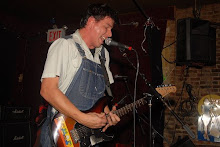
The very rarely heard and recorded "General William Booth Enters Into Heaven" was
the other Ives piece from the 2004 Alan Gilbert/NY Phil program which ended with Symphony No. 4, posted below.
General Booth is the founder of The Salvation Army. The piece is a characteristically ambitious Ivesian challenge, built around the sung text of Vachel Lindsay's 1912 poem. I've copied some of it below, and think it an appropriate mechanism to countenance the fears of, frankly, the worst case scenario of our economic reality; the music is simply a very stirring piece:
General William Booth Enters into Heaven
by Vachel Lindsay
[To be sung to the tune of `The Blood of the Lamb' with indicated instrument]
I
[Bass drum beaten loudly.]
Booth led boldly with his big bass drum --
(Are you washed in the blood of the Lamb?)
The Saints smiled gravely and they said: "He's come."
(Are you washed in the blood of the Lamb?)
Walking lepers followed, rank on rank,
Lurching bravoes from the ditches dank,
Drabs from the alleyways and drug fiends pale --
Minds still passion-ridden, soul-powers frail: --
Vermin-eaten saints with mouldy breath,
Unwashed legions with the ways of Death --
(Are you washed in the blood of the Lamb?)
[Banjos.]
Every slum had sent its half-a-score
The round world over. (Booth had groaned for more.)
Every banner that the wide world flies
Bloomed with glory and transcendent dyes.
Big-voiced lasses made their banjos bang,
Tranced, fanatical they shrieked and sang: --
"Are you washed in the blood of the Lamb?"
Hallelujah! It was queer to see
Bull-necked convicts with that land make free.
Loons with trumpets blowed a blare, blare, blare
On, on upward thro' the golden air!
(Are you washed in the blood of the Lamb?)
II
[Bass drum slower and softer.]
Booth died blind and still by Faith he trod,
Eyes still dazzled by the ways of God.
Booth led boldly, and he looked the chief
Eagle countenance in sharp relief,
Beard a-flying, air of high command
Unabated in that holy land.
[Sweet flute music.]
Jesus came from out the court-house door,
Stretched his hands above the passing poor.
Booth saw not, but led his queer ones there
Round and round the mighty court-house square.
Yet in an instant all that blear review
Marched on spotless, clad in raiment new.
The lame were straightened, withered limbs uncurled
And blind eyes opened on a new, sweet world.
[Bass drum louder.]
Drabs and vixens in a flash made whole!
Gone was the weasel-head, the snout, the jowl!
Sages and sibyls now, and athletes clean,
Rulers of empires, and of forests green!
[Grand chorus of all instruments. Tambourines to the foreground.]
To be administered at full volume as tonic and rejuvenative conduit, esp. as one walk out the door to do one's election-related duty! Artwork is the same because it was on the same bill. sorry about the non-inclusion of that text on the cover.
































